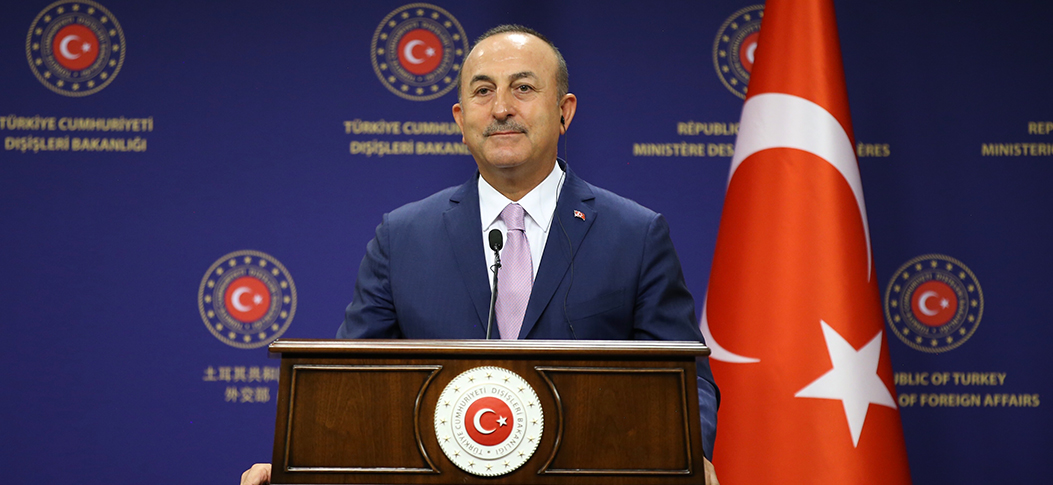“Turkey respects thoughts, advice to protect Hagia Sophia”

Foreign Minister Mevlüt Çavuşoğlu held a joint press conference with his Spanish counterpart Arancha Gonzalez Laya in the capital Ankara.
Several countries, including Spain, agree that Hagia Sophia is Turkey’s internal matter, the Turkish foreign minister said on Monday.
"Reopening of Hagia Sophia for worship is not a one-upmanship against any country or belief," Mevlut Cavusoglu said.
Çavuşoğlu said Turkey respects the thoughts and pieces of advice to protect Hagia Sophia which was added to the UNESCO World Heritage List in 1985.
Underscoring that Turkey engages dialogue with UNESCO, he said Turkey will continue to protect Hagia Sophia’s all unique features as a world cultural heritage.
On the reaction of Greece about the issue, Cavusoglu said the attitude of Greece is not understandable.
On Greece action of flowing its flag on half-mast, Cavusoglu said Greece acted as there was a dispose of their property.
He said Greek should acknowledge that Istanbul was conquered in 1453 and Hagia Sophia served as a mosque for nearly 500 years.
Çavuşoğlu called the acts of burning of Turkish flag in Greece and lowering flags over Hagia Sophia as "weak behaviors".
A group of far-right Greek extremists burned Turkish flags late Friday in Thessaloniki to protest the reopening of the Hagia Sophia Grand Mosque for worship in Istanbul.
Spanish Foreign Minister Laya said Turkey’s intention of observing UNESCO criteria regarding Hagia Sophia was praiseworthy, adding that they see Istanbul’s architectural gem as a common heritage of all humanity.
Last Friday, the first prayers after an 86-year hiatus were held in the Hagia Sophia Grand Mosque.
Hagia Sophia served as a church for 916 years until the conquest of Istanbul, and a mosque from 1453 to 1934 -- nearly 500 years -- and most recently as a museum.
It remains one of the most visited historic buildings in Turkey by domestic and international tourists.
Libya issue
On the EU’s attitude to Libya, the top Turkish diplomat said Operation Irini is "definitely biased", supports Haftar and "punishes" the Libyan government.
He said Operation Irini does nothing about weapons, ammunition, and assistance that are sent from France, Russia, Egypt, Syria, and the UAE to the Haftar forces.
Stressing Turkey’s cooperation with the UN, Cavusoglu said the countries, from which the UN has requested help, did not respond to the UN Security Council’s call to support the Libyan government and to cut contact with groups outside it.
"Turkey has been the only country that responded to the UN call," he noted.
Highlighting the importance of the political solution in Libya, Cavusoglu said it is a very positive attitude that Spain supports the political solution in Libya.
On March 31, the EU launched Operation Irini to enforce the UN arms embargo on Libya’s warring sides.
However, the operation mainly focuses on maritime activities in the Mediterranean, while warlord Khalifa Haftar’s side – enemy of the legitimate Libyan administration – continues to receive arms and ammunition mainly by air and land, according to Libyan Prime Minister Fayez al-Sarraj.
Libya has been torn by civil war since the ouster of Muammar Gaddafi in 2011.
Libya’s new government was founded in 2015 under a UN-led agreement, but efforts for a long-term political settlement failed due to the military offensive by the warlord Khalifa Haftar’s forces.
The UN recognizes the Libyan government headed by al-Sarraj as the country’s legitimate authority.
Libya’s legitimate government has been under attack by Haftar’s forces since last April, and more than 1,000 people have been killed in the violence.
Haftar has the support of the UAE, Egypt, and Russia while the UN-recognized government is backed by Turkey.
*** - Relations among NATO countries
*** Underlining the significance of the alliance, Cavusoglu said everyone should avoid behaviors that could weaken NATO.
*** "Putting forward new pre-conditions, when an ally needs NATO’s support, weakens this alliance," he said.
*** There must be full solidarity among the allies, he added.
Travel restrictions of EU
Criticizing the EU’s travel restrictions, Cavusoglu said: "Unfortunately, the criteria are far from being objective."
He said Turkey has shared all its daily COVID-19 data with the World Health Organization, EU and other countries.
Çavuşoğlu also noted that when Turkey’s data is compared with that of the other countries -- for which the EU does not implement restrictions -- it can be seen that Turkey is in a much better condition.
On the EU’s attitude about the restrictions, he stressed that it can be said that the travel restrictions of the EU have been determined according to political criteria.
Turkey recently adopted a safe tourism certification program with the collaboration of several government ministries to ensure the safety of tourists amid the outbreak. Under the program, a variety of measures have been adopted in many fields, including transportation, accommodation, condition of tourist facilities and the training of their employees, along with the health status of travelers.
Bilateral relations with Spain
On the relations between Turkey and Spain, Cavusoglu said the bilateral trade and investment volumes are expanding each day.
"We aim to expand bilateral trade volume to $20 billion," he said.
Cavusoglu also said Turkey will encourage investors and business people to achieve this goal.

